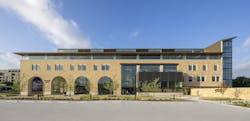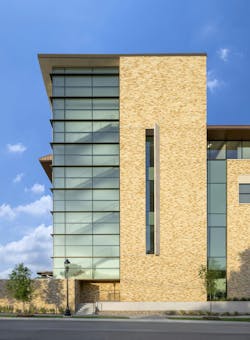Texas Christian University opens new medical school building
Texas Christian University today officially completed its opening of Arnold Hall, a 95,000-sf, four-story home to the institution’s Anne Burnett Marion School of Medicine.
Arnold Hall marks TCU’s first major off-campus development, and initiates future growth for the university’s downtown Fort Worth location. The project team—which included the architects CO Architects and Hoefer Welker, and the general contractor Linbeck—collaborated with the city of Fort Worth to select and establish the location near urban medical districts and Near Southside, an urban mixed-use community, to build a bioscience sector.
The new medical school sits less than a mile from Baylor Scott & White All Saints Medical Center–Fort Worth, Cook Children’s Medical Center, Medical City Fort Worth, and Texas Health Harris Methodist Hospital.
Construction of Arnold Hall—which had been in the works for a decade—was completed in July. The project was Plan B, after TCU and the University of North Texas Health Center couldn’t reach agreement for building under a private-public partnership. (The two parties split in January 2022, according to KERANews.)
Arnold Hall serves as an academic hub for 240 medical students annually, and nearly 150 faculty and staff. TCU administrators have estimated that the Burnett School of Medicine will create 31,200 jobs and have annual economic impact of $4 billion by 2030.
Future-ready facility
The new $62 million facility encourages collaboration via a commons area, library, classrooms, faculty offices and suites. Its third floor houses anatomy and experimental labs with AR and VR technologies. Students also have access to high-fidelity human mannikins in a medical simulation suite, where they can practice team-based care.
In the building’s clinical rooms, students hone their communications and diagnostic skills with patient-actors. And TCU’s curricula allow students to partner with physicians on their first day of medical school to identify drivers in the future of medicine that include artificial intelligence, genomics, and using technology to monitor patient health and diseases.
The Arnold Hall “communicates TCU’s commitment to creating dynamic state-of-the-art facilities for next-generation medical education,” said Stuart D. Flynn, MD, founding dean of the Burnett School of Medicine, in a prepared statement. Jonathan Kanda, FAIA, Principal with CO Architects, added that the goal of Arnold Hall is to create a school that is capable of “accommodating future technological and pedagogical advances in medical education.”

